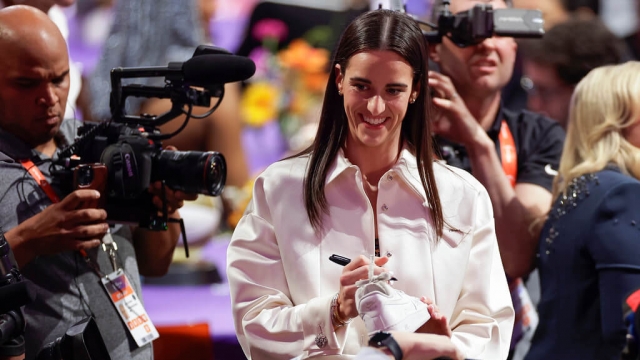More than 2.4 million viewers tuned in to Monday's WNBA draft. Viewership was up more than 300% from last year, with more people watching the WNBA draft than this year's NHL and MLB drafts combined.
Despite the surge in viewership, the WNBA still lags far behind the NBA in terms of revenue and player compensation.
Iowa's Caitlin Clark, who went first overall to the Indiana fever, will make north of $76,000 in her first year, with incremental increases over 4 years.
For comparison, last year's No. 1 NBA draft Victor Wembanyama is bringing in $12 million for his rookie year.
On Wednesday, Scripps News spoke with Terri Carmichael Jackson, Executive Director of the WNBA Players Association, about compensation, comparison with the NBA and the near future of the WNBA as it reaches a new audience.
Player salaries
"To everybody who's been paying attention to professional women's basketball, to everybody who's been paying attention to the [WNBA] and the high level of talent there knows that it has always been an issue — not just now," Jackson said. "But because we have these rock stars that are coming in that are so well known from their collegiate play, people are paying attention again, or paying attention still. Whatever it is, I'm happy. I'm here for it."
How WNBA revenue is shared
"Previously revenue share was tied to ticket sales, and the teams weren't really incentivized to make ticket sales happen," Jackson said. "And they didn't really have the staff. Many teams didn't really have the staff that they needed to sell those ticket packages. So now we have in our 2020 [collective bargaining agreement], a revenue-share provision that ties it to the success of this league at the league level, at the highest level. And so when we see the league doing well and we see them bringing in additional corporate partners — which this commissioner has done and done well — when we see them bring in additional broadcast deals, the opportunity to trigger that revenue share becomes that much closer, and we're very close."
Collective bargaining
"This 2020 CBA doesn't expire until 2027. However, there's an opportunity for the players or the league to opt out. And that decision has to be made this year after this season by November 1st. If the players vote to opt out after our review of the state of the business and our recommendation to them, they must do so in writing. If the league looks to opt out, they must do so in writing. Either side has inform the other side of its decision by November 1st. So a lot goes into that decision-making. There's a lot of review, there's a lot of discussion. We've convened our CBA committee already to have those conversations going into that vote at the end of the season."
Player travel accommodations
"As I have said every year since we went into negotiations for the 2020 CBA and coming out of those negotiations every year, every offseason, we look to engage the league in a conversation that is thoughtful, that talks about phasing in chartered travel in a reasonable way." Jackson said. "Never — and I want to say this to your audience and to everybody to kind of spread this word and clear up this misconception — never have these players asked for a full season of travel. We know how expensive it is. We're mindful of the business. They are responsible and they are mindful of this legacy that they're looking to protect and to build on. But what they want is for their employers, for the league and for the teams to pay attention to their health and safety. That's what the travel issue is always all about: Their safety, their health, their ability to recover."
SEE MORE: Serena Williams says she's 'super interested' in owning a WNBA team
Trending stories at Scrippsnews.com



